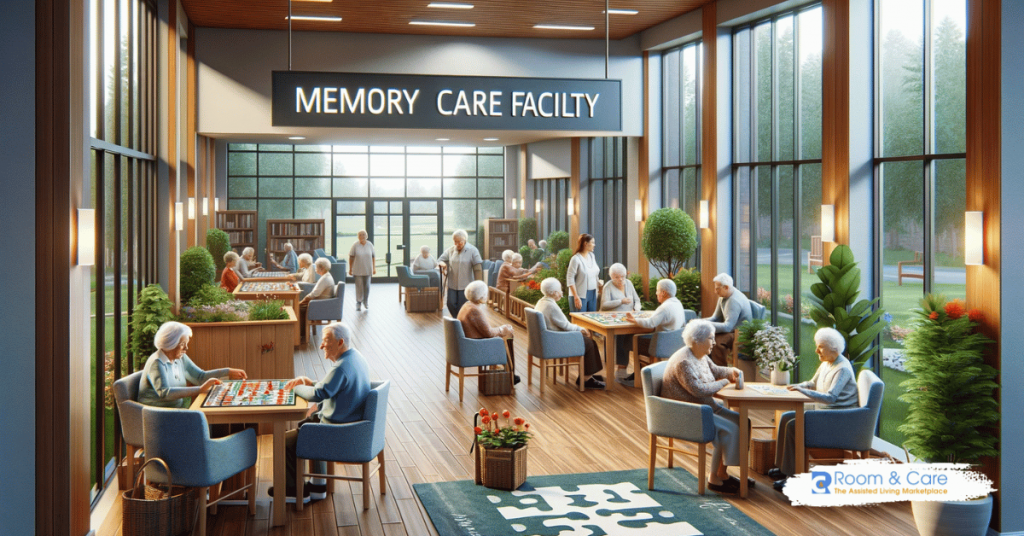Relied On Charlotte Memory Care: Expert Assistance for Your Liked Ones
Relied On Charlotte Memory Care: Expert Assistance for Your Liked Ones
Blog Article
Producing a Safe and Helpful Setting: In-Home Memory Treatment Essentials
Developing a safe and secure and nurturing setting for individuals calling for at home memory treatment is extremely important to their wellness and lifestyle. From ensuring security within the home to utilizing effective interaction techniques and applying memory-friendly style aspects, there are vital components that add to a holistic treatment approach. By concentrating on creating an encouraging community that satisfies the distinct demands of those with memory impairments, caregivers can dramatically enhance the everyday experiences of their enjoyed ones.

Safe Living Environment
Producing a hazard-free and safe living setting is extremely important when providing in-home memory care for individuals with cognitive disabilities. Guaranteeing the security of the private with memory loss is critical to prevent accidents and advertise a sense of wellness.
In addition, it is very important to mount safety and security attributes such as grab bars in shower rooms and hand rails along staircases to offer support and avoid accidents. In addition, making use of modern technology such as activity sensing units and alarms can notify caregivers if the private wanders or is in distress. Creating a secure living setting likewise involves executing strategies to prevent straying, such as making use of door alarms or locks to restrict access to harmful areas. By focusing on precaution and eliminating prospective risks, caregivers can give a safe and supportive environment for people with cognitive impairments obtaining in-home memory care.
Reliable Communication Approaches
Executing customized communication methods is essential in fostering purposeful interactions with people with cognitive problems in the context of in-home memory treatment. Efficient interaction plays an important duty in producing an encouraging environment that enhances the health and quality of life for people with memory issues. When connecting with a person experiencing cognitive decline, it is necessary to make use of easy and clear language, keep a calm and positive tone, and supply aesthetic signs to aid comprehension.
One secret approach is to exercise energetic listening, showing empathy, persistence, and regard throughout discussions. Non-verbal signs such as faces and body language can likewise assist share understanding and assistance. In addition, using reminiscence therapy by talking about previous experiences or making use of songs and art can use lasting memories, sparking links and boosting involvement.
In addition, including normal regimens and constant interaction patterns can supply a sense of experience and safety for individuals with memory impairments. By executing these communication techniques, caregivers can establish purposeful links and promote a sense of convenience and trust fund in the at home memory care setting.
Memory-Friendly Layout
Offered the relevance of producing a helpful environment for people with memory concerns with efficient communication techniques, the incorporation of memory-friendly style aspects in the living space becomes crucial in enhancing their day-to-day experiences and overall health. Memory-friendly style focuses on boosting security, comfort, and freedom for people with cognitive disabilities. Basic adjustments can make a significant distinction, such as making use of contrasting colors to improve exposure and reduce complication, incorporating clear signs to help navigation, and lessening clutter to protect against sensory overload.
Integrating acquainted aspects from the individual's past, such as individual photos or preferred things, can stimulate positive memories and produce a feeling of familiarity. In addition, guaranteeing adequate illumination degrees, setting up grab bars in bathrooms, and carrying out non-slip floor covering can help stop drops and injuries. Creating a comforting and calming atmosphere via the usage of acquainted scents, soft structures, and relaxed sounds can additionally advertise relaxation and reduce anxiety. By incorporating these memory-friendly layout components, caregivers can offer a risk-free and helpful space that makes it possible for people with memory issues to maintain their independence and top quality of life.
Daily Routine Preparation
When establishing a daily regimen for individuals with memory problems, check over here careful preparation is necessary to support their cognitive feature and total wellness. Establishing an organized routine can assist reduce anxiousness, confusion, and disorientation commonly experienced by those with memory impairments.
Versatility is essential, as some days might call for adjustments based on the individual's mood and energy degrees. Regularly assessing and adapting the everyday routine will assist ensure its effectiveness in promoting a positive and comforting environment for people with memory obstacles.
Support Group Execution
Developing a durable network of helpful individuals plays an essential site here function in improving the high quality of care and well-being for people needing memory support. Member of the family, close friends, medical care experts, and neighborhood resources can all add to producing a solid support group. Interaction among these individuals is important to guarantee that the needs of the specific with memory obstacles are fulfilled successfully.
Relative are often the main caregivers and create the backbone of the support system. They supply daily treatment, emotional support, and companionship. It is critical for family participants to seek aid and respite when needed to stop fatigue and guarantee the most effective possible look after their enjoyed one.
In addition to household assistance, including medical care professionals such as therapists, nurses, and physicians can supply customized treatment and guidance. These experts can use beneficial insights, medical advice, and support in handling the person's problem.

Verdict
To conclude, creating a risk-free and supportive setting for people with memory care requirements is necessary for their health. By developing a secure living atmosphere, using reliable interaction strategies, incorporating memory-friendly design components, intending day-to-day regimens, and carrying out a solid support group, caretakers can assist improve the quality of life for those with memory loss. These essential components interact to produce a nurturing and equipping atmosphere that promotes freedom and enhances overall lifestyle.
Developing a safe and hazard-free living atmosphere is paramount when her latest blog providing at home memory treatment for individuals with cognitive problems. By focusing on safety measures and getting rid of potential threats, caregivers can provide a supportive and safe and secure environment for people with cognitive disabilities receiving at home memory care.
Developing a robust network of encouraging individuals plays a critical duty in improving the quality of treatment and well-being for people requiring memory assistance - Charlotte Memory Care. Communication amongst these individuals is crucial to make sure that the needs of the private with memory challenges are satisfied effectively

Report this page